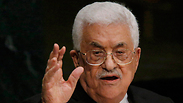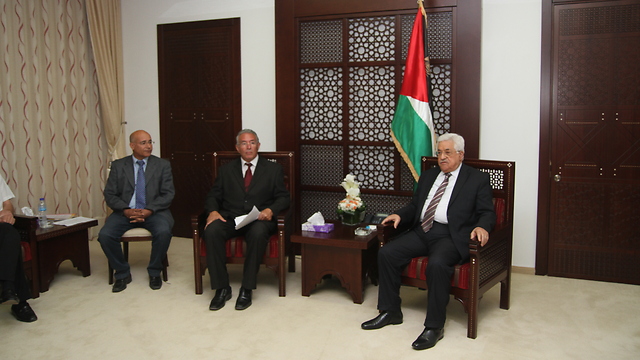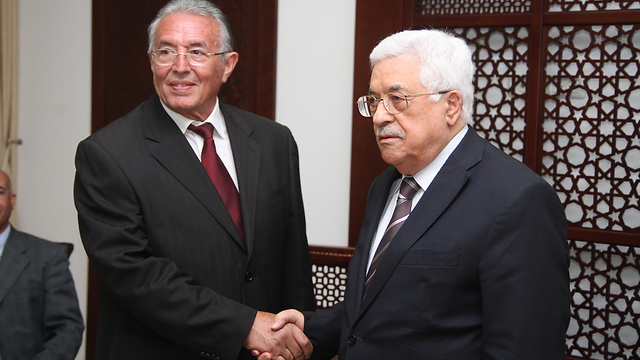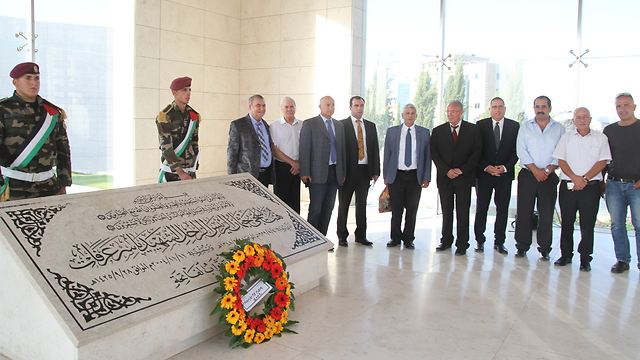
Israeli mayors meet with Abbas
A delegation of mayors and council heads from northern Israel visited Palestinian president in Ramallah to demonstrate willingness for peace.
“If Lieberman says he supports the two-state solution, nothing will prevent us from speaking with him,” Abbas said in the meeting held at the Palestinian presidential compound in Ramallah.
Lieberman, who has earned a reputation as a tough-talking hawk, described the Arab peace plan for two states as containing “positive elements” on Monday night in a press conference with Prime Minister Benjamin Netanyahu after being sworn in as defense minister.
“If he really means it, we’ll forget everything he said about us – that we’re diplomatic terrorists,” Abbas said, referring to harsh comments Lieberman has made about the Palestinian leadership. “We won’t judge him by the past but rather by what he does now and in the future.”
The Israeli delegation of mayors arrived on the eve of an international peace conference in Paris on Friday – and as Israeli leaders turn to Egypt to spearhead new talks with the Palestinians – to discuss another peace conference to be held in, of all places, the small northern Israeli town of Ma’alot Tarshiha.
“I call on Prime Minister Netanyahu to hold a conference in Ma’alot Tarshiha – not in Paris and not in Egypt,” said Shlomo Bohbot, the town’s mayor of forty years, to Abbas.
Abbas, declined to answer if he would attend the conference planned for the end of summer, though he welcomed the visit by Bohbot and the 18 other Israeli leaders as “proof of the depth of commitment to advance peace.”
Bohbot, a former Knesset member, hailed his Ma'alot Tarshiha, which was formed in 1976 by the union of the Jewish community of Ma’alot with the Arab village Tarshiha, as a model for peace and coexistence. He also tried to allay concerns about the current right-wing Israeli government.
“Mr. President, there’s nothing to be afraid of with Lieberman,” Bohbot told Abbas. “He says a lot of things to get attention but in fact he’s much more practical,” he claimed.
“I’m not a fan of Lieberman – quite the opposite,” Bohbot, a member of the center-left Labor party, clarified. “But Israeli politics has proven that only the rightist camp gets support from the public to make concessions,” noting two hawkish Israeli prime ministers, Menachem Begin and Ariel Sharon, who boldly returned swaths of territory Israel had conquered in war.
Abbas seemed to welcome the analogy, emphasizing that he “won’t judge someone by their political affiliations” and that the Israeli “right has the potential to initiate peace.”
“It’s not a matter of right or left,” Moti Dotan, head of the Lower Galilee Regional Council and a member of the right wing Likud party, told TPS when asked why he attended the meeting with Abbas. “We must do everything to advance dialogue, and if this does anything to bring peace closer than I did my part.”
“I think Abbas is our last chance for the next decade for a leader who’s willing make the effort and put himself out there to engage us in dialogue,” Dotan added. “And I’m worried that if we miss this chance, then we’ll find ourselves later on talking to someone much more extreme.”
The mood among Israelis and Palestinians alike was buoyed by optimism, as the leaders exchanged warm words and smiles. Only the journalists were irritated, since security ejected us from Abbas’s speech just moments after it began – despite the president’s objections that we be allowed to stay (causing some to openly wonder whether the president, in fact, controlled his own office).
“I came because I believe in coexistence and that our region must somehow find peace,” Fawad Awad, mayor of the northern Arab-Israeli town of Mazra’a, told TPS. “We have no other land.”
Another northern mayor, Ofer Ben-Eliezer of the town Ramat Yishai, echoed the sentiment. “If we engage in dialogue then we can make progress,” he said. “Leaving politics aside, we’re just people – people who live in a country that wants peace and security.”
After the meeting, as the Israeli delegation and their Palestinian hosts loosened up at a dinner at Ramallah’s luxurious Grand Park Hotel, the spirits soared even higher.
“I met a very simple, warm man – and we can make peace with him,” Bohbot told TPS, adding that the meeting exceeded his expectations.
“I’ve met the president many times before, but this is the first time I really got excited,” Awad told the group. “I saw that there’s a real leader who actually wants peace.”
Nazim Mahoul, a businessman from the Druze town of Peki’in in the Galilee next to Ma’alot Tarshiha, waxed poetic.
“This is a turning point. The crisis of trust is ending,” he said in both Arabic and Hebrew. Then he quoted a line Mahmoud Darwush, the great poet of Palestine: “Show me one soldier who, after he died, knows who won the war.”
This article was reprinted with permission from TPS













